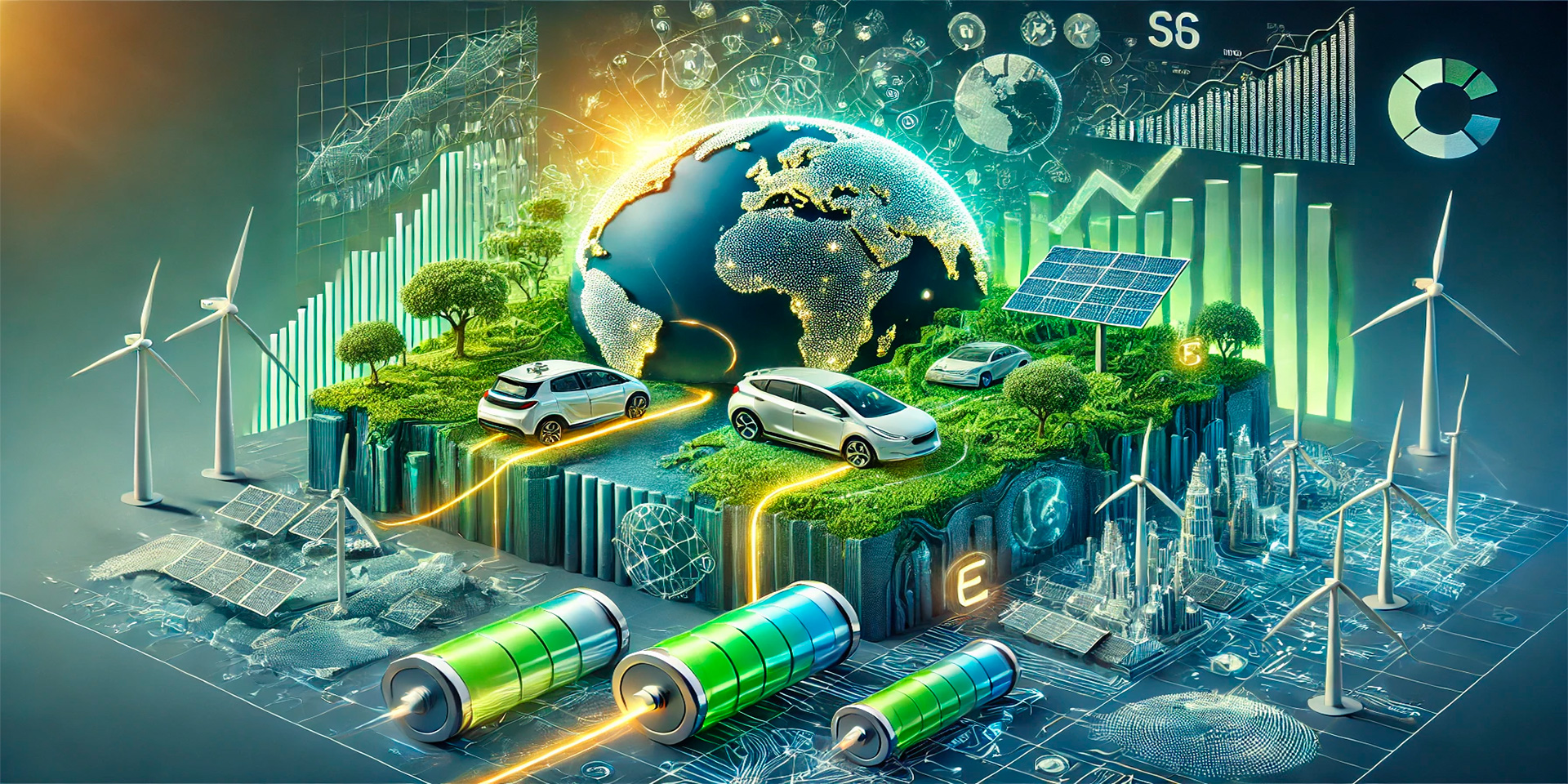In the era of energy transition, lithium has rapidly emerged as one of the most sought-after commodities. Often dubbed “the new oil,” lithium’s importance is primarily driven by its crucial role in the production of batteries for electric vehicles (EVs), renewable energy storage systems, and various other technologies essential for the green energy revolution. As global economies shift toward decarbonization and cleaner energy solutions, the demand for lithium continues to soar, reshaping the energy landscape. This article delves into the economic implications of lithium’s rise, exploring its impact on global energy markets, geopolitics, and the future of sustainable development.
The Role of Lithium in the Energy Transition
Lithium plays an integral role in the energy transition due to its ability to store energy efficiently. As the world moves away from fossil fuels and towards renewable energy sources, the need for advanced energy storage technologies has become more pressing. Lithium-ion batteries, known for their high energy density, long cycle life, and lightweight properties, are seen as the backbone of this transition.
1. Powering the Electric Vehicle Revolution
The global push for electric vehicles (EVs) has been a driving force behind the surge in lithium demand. Lithium-ion batteries are essential in powering EVs, and as automakers around the world shift away from internal combustion engines, lithium has become indispensable in achieving emission reduction goals.
The impact of lithium on the EV market:
- Explosive growth in demand: As EV adoption rises, so does the demand for lithium. In 2022, EVs accounted for over 10 million vehicles sold globally, and this number is projected to grow exponentially in the coming years.
- Battery capacity: Lithium is crucial for the high-capacity batteries required to provide long driving ranges in EVs. This has driven technological advancements in lithium extraction and battery manufacturing.
- Government policies and incentives: Governments worldwide are offering incentives to consumers and automakers to accelerate EV adoption, further increasing the demand for lithium and reinforcing its role as a key energy resource.
2. Enabling Renewable Energy Storage
One of the major challenges of renewable energy, such as solar and wind, is intermittency — the ability to generate power only when the sun is shining or the wind is blowing. Lithium-ion batteries provide an effective solution to this challenge by storing excess energy for later use, ensuring a reliable and stable energy supply even during periods of low generation.
How lithium supports renewable energy systems:
- Energy storage systems: Large-scale lithium-ion battery storage systems are being deployed to store energy generated by renewable sources, helping to stabilize grids and reduce dependency on fossil fuel-based backup power.
- Grid balancing: Lithium batteries are increasingly used for grid stabilization and load balancing, ensuring that excess energy is captured and distributed when demand is high.
- Global renewable energy targets: As countries commit to achieving net-zero emissions by 2050, lithium becomes a critical component in scaling up renewable energy infrastructure and reducing reliance on traditional power sources.

Economic Implications of Lithium’s Rise
The growing demand for lithium has significant economic implications for both producing countries and global energy markets. As lithium becomes more critical to the energy transition, its influence extends far beyond the realm of energy production, affecting geopolitics, trade relations, and investment flows.
1. Impact on Global Energy Markets
Lithium is increasingly viewed as a cornerstone of the global energy market, akin to how oil has been a critical driver of global economic activity for decades. As lithium’s role in the energy transition strengthens, it is expected to shape the future dynamics of the energy sector, with new markets and opportunities emerging around its production, processing, and technological applications.
How lithium is shaping energy markets:
- New resource geopolitics: Lithium-rich countries, such as Australia, Chile, and Argentina, are becoming key players in the global energy landscape, leading to shifts in geopolitics and trade alliances.
- Price volatility: Similar to oil, lithium prices have become volatile due to supply and demand imbalances. As demand accelerates, fluctuations in lithium prices could impact the overall cost structure of EVs, renewable energy systems, and battery technologies.
- Investment in lithium mining and infrastructure: With rising demand, countries and private companies are making substantial investments in lithium mining, refining technologies, and battery production to ensure a stable supply chain for future energy needs.
2. Geopolitical Shifts and Resource Control
As the demand for lithium intensifies, resource-rich countries are positioning themselves strategically in the global economy. Control over lithium reserves has become a geopolitical issue, with nations vying for dominance in the lithium market. This shift mirrors the global competition for oil in the 20th century, where resource access played a significant role in international relations and political strategies.
Geopolitical consequences of lithium control:
- Resource-driven diplomacy: Countries with significant lithium reserves are increasingly leveraging their position in international negotiations, influencing trade deals and global supply chains.
- Supply chain dependency: Nations that lack domestic lithium resources may face increased dependency on suppliers, creating vulnerabilities in their energy and manufacturing sectors.
- China’s dominance: China has positioned itself as a key player in the lithium supply chain, controlling a significant portion of global lithium processing and refining, which gives it substantial influence over the global energy transition.
3. Economic Growth in Lithium-Producing Countries
For countries that possess abundant lithium reserves, the metal represents a significant opportunity for economic growth. The development of lithium extraction industries can create jobs, stimulate local economies, and attract foreign investment. However, the benefits may not be evenly distributed, and resource-rich countries may face challenges related to environmental degradation, social inequality, and the so-called “resource curse.”
The economic impact on lithium-producing countries:
- Job creation and economic diversification: The lithium sector can provide employment opportunities in mining, processing, and battery manufacturing, diversifying economies and reducing dependence on other industries like fossil fuels.
- Attracting foreign investment: As lithium becomes more valuable, foreign investment in extraction technologies, infrastructure, and processing facilities is increasing, benefiting national economies.
- Environmental and social challenges: Despite the economic benefits, lithium mining can have significant environmental and social impacts, including water usage, land degradation, and community displacement, which need to be carefully managed to ensure sustainable growth.

The Future of Lithium and Global Economies
Lithium’s central role in the energy transition is expected to grow even more significant in the coming decades, with continued technological advances in electric vehicles, renewable energy storage, and other green technologies. As governments and businesses accelerate efforts to reduce carbon emissions and promote sustainable energy, lithium will remain a cornerstone of these initiatives, shaping the future of global economies.
1. Investment in Lithium Technologies
Investments in lithium technologies, such as more efficient extraction methods, recycling processes, and battery innovations, will drive down costs and make lithium more accessible for widespread use. Governments and private sectors must prioritize research and development to ensure that lithium supply remains sufficient to meet future demand while addressing environmental concerns associated with its extraction.
Future opportunities in lithium technologies:
- Battery recycling: The development of efficient lithium recycling technologies will help meet the growing demand for batteries and reduce the environmental impact of mining.
- Alternative extraction methods: New methods of extracting lithium, such as direct lithium extraction (DLE), may improve the sustainability and economic feasibility of lithium production.
- Improved battery storage: Research into advanced battery technologies will enhance the efficiency, storage capacity, and longevity of lithium-ion batteries, supporting the continued growth of EVs and renewable energy storage systems.
2. Balancing Economic Growth with Sustainability
As lithium plays an increasingly central role in the global economy, it is essential to strike a balance between economic growth and environmental sustainability. Responsible mining practices, effective resource management, and robust regulatory frameworks will be key to ensuring that the demand for lithium does not lead to long-term environmental damage or social inequality.
Ensuring sustainable lithium growth:
- Environmental regulations: Strong regulations must be implemented to minimize the environmental impact of lithium mining, including water conservation, waste management, and habitat protection.
- Equitable distribution of benefits: Efforts must be made to ensure that the economic benefits of lithium production are equitably shared, with particular attention to the welfare of local communities.
- Global cooperation: International cooperation will be needed to ensure fair trade, ethical mining practices, and equitable access to lithium resources as the demand continues to rise.
Conclusion
Lithium has become a critical element in the global energy transition, driving the development of electric vehicles, renewable energy systems, and advanced battery technologies. Its rise as the “new oil” highlights its importance in shaping the future of global economies, influencing everything from geopolitics to market trends. As the world embraces sustainable energy solutions, lithium will continue to play a central role, offering both opportunities and challenges for governments, businesses, and consumers alike. By addressing environmental concerns, promoting innovation, and ensuring responsible management, we can unlock lithium’s full potential and use it to build a cleaner, more sustainable future.

